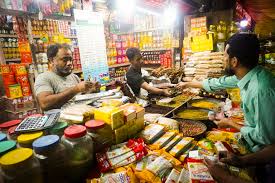Ramadan knocking at the door: Escalating food prices spark worries
- Update Time : Saturday, January 25, 2025

TDS Desk:
With inflation already near record levels and traders raising the prices of essential commodities ahead of Ramadan, low- and middle-income families fear greater struggles as the fasting month approaches.
The interim government has assured that it has taken measures to ensure a steady supply of essential commodities and prevent syndicate-created market instability during the holy month.
Prices are usually increased during Ramadan almost every year using various excuses and the past experiences raise no hope among general people despite the government’s assurance.
Commerce Adviser Sk. Bashir Uddin that various initiatives have been taken to keep the prices stable and ensure adequate stock of essentials ahead of Ramadan and Eid.
“The government is making every effort to control prices during Ramadan. Strict monitoring will be ensured to keep the market free of syndicates,” the adviser said.
The government is ready to maintain the supply of essential items such as dates, chickpeas, lentils and other staples during Ramadan. “The food market will remain stable and prices are expected to decrease.”
Adviser Bashir Uddin said he warned traders against unethical practices and urged them to act responsibly and help keep the market stable during Ramadan.
The government’s main aim is to protect the sanctity of Ramadan and create a market environment that brings relief to consumers, he added.
Meanwhile, Chief Adviser Dr Muhammad Yunus has instructed field-level officials to prioritise the smooth supply of goods and keep the prices of essentials within people’s purchasing capacity during the fasting month, he said.
The government has taken some steps, including market monitoring, syndicate control and ensuring uninterrupted supply of essentials, he said.
CONTROLLING SYNDICATES
The adviser said monitoring has been intensified to prevent artificial crises and price hikes caused by syndicates of traders.
The Directorate of National Consumer Rights Protection (DNCRP) and other law enforcement agencies will work to check unethical practices.
UNINTERRUPTED SUPPLY
Adequate stocks of essential items such as rice, lentils, sugar, cooking oil, onions and garlic have been ensured and measures have been taken to prevent any disruptions in import and supply chains.
DAILY MARKET MONITORING
Daily surveillance will be enhanced to detect and penalise unscrupulous traders and instant action will be taken against those attempting to create artificial crises.
The adviser said consumers have been urged to avoid panic buying and purchase goods at fair prices.
EXPANSION OF TCB ACTIVITIES
The distribution of essentials through the Trading Corporation of Bangladesh (TCB) at subsidized rates have been scaled up to ensure availability of goods throughout Ramadan.
SPECIAL TASK FORCE
A special task force under the Ministry of Commerce has been formed to monitor market trends and prevent artificial crises.
According to Commerce Ministry officials, the imports of essential commodities such as chickpeas, lentils, dates, sugar and soybean oil have been expedited to ensure steady supply until Ramadan.
The government has also planned to establish storages to control potato prices.
INFLATION
Bangladesh’s economy in 2024 faced major challenges as rampant inflation not only eroded purchasing power but also overshadowed the country’s progress in other areas.
The inflation rate in Bangladesh reached an alarming average of 11.38% in November 2024, marking the highest level in over a decade. It hit 11.66 percent in July, the highest at least since the 2010-11 fiscal year, driven mainly by food prices reflecting the worsening of the purchasing capacity of people.
This sharp increase was fuelled primarily by escalating food prices, which constitute a significant portion of household expenditure and the Consumer Price Index (CPI).
Food inflation, in particular, hovered around 12%-14% for most of the year, as prices of essentials like rice, cooking oil, and vegetables surged.
Non-food inflation also rose steadily, driven by increased transportation costs, higher utility bills, and imported goods becoming more expensive due to currency depreciation.

















